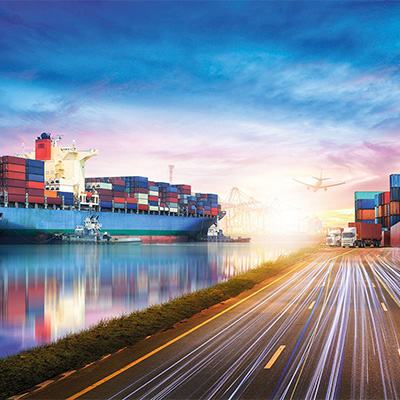Dr Emel Aktas, Senior Lecturer in Logistics and Supply Chain Management
In the developed world, our relationship with food is based on a fantasy of plenty, choice, and low prices. Hidden behind this haze is the huge complexity of the global supply chains involved, the costs in terms of natural resources and a sprawling trail of waste.
The global population is predicted by the United Nations to swell to almost 10 billion by 2050. On one level, achieving ‘food security’ for all those people - reaching a state where food is available, accessible, and meets the needs of populations in terms of nutrition and culture for the long-term - is entirely possible. Arguably, advances in agritech mean we can overcome the limitations of natural resources, the need to produce more from land and water supplies under pressure.
The essential cause of food insecurity is not a lack of potential supplies but their unequal distribution: the 795 million people living in ‘hunger’ (around one in eight people in developing countries) alongside the 640 million who are obese (according to the World Health Organisation). We live in a world where more people are overweight than underweight.
And the root is the mindset of the modern consumer - and its profligacy - versus the reality of global food production and all its entangled intricacies and frailties. But the problem now, and increasingly for the future, is the growing numbers of consumers joining this world of fantasy. The OECD argues there will be two billion more ‘middle-class’ consumers by 2030, with particular growth in China, India, and sub-Saharan Africa, vast classes of people expecting and demanding higher standards of living, including luxurious diets.
Too often food security is regarded as an overseas aid issue, not relevant to ourselves. Despite its heritage in agriculture, a primary factor in allowing Britain to become the first industrial power, there is a growing level of dependence on international land and networks. More than 50% of food and animal feed is imported. The National Farmer’s Union claimed in 2015 that the UK would only be able to feed 53% of its population by the mid-2040s. Food ‘deserts’ - typically urban areas where local populations are limited to processed, high-calorie foods - continue to be a problem. Brexit is a particular and additional threat. Traditionally UK agriculture has been heavily dependent on an EU workforce for harvesting jobs, the types of work and pay rejected by British workers. Even if allowances are made for migrant workers in the sector, Europeans are less likely to want to work in a country where their status has been downgraded to that of a temporary immigrant. Much of UK supplies come through EU ports initially, where checks are made. The UK is likely to have to replace this system with its own regulations and processes, staffed by newly trained inspectors. The lack of integration also means issues with both the flow in and out of imports and exports of any food products. If we follow the US Food and Drug Administration regulations, for example, the EU will be looking very closely at all additives and supplements in manufactured produce.
The situation in a country like Qatar is a microcosm of the threats and challenges around food security for the modern world, perhaps in a heightened and exaggerated form. The SAFE-Q project, research led by Cranfield’s School of Management and funded by the Qatari government, is attempting to minimise food waste to improve the security of its supplies. The wealthiest nation in the world (with a per capita income of more than $140,000 compared with around $50,000 in the USA), Qatar is also founded on food imports, around 90% of daily supplies. Similar to the internationalism of most developed nations, a large proportion of its population are expats, meaning high expectations in terms of quality of life and a wide range of wants and needs. At the same time, most imports arrive through a single container port in Doha; majority of poultry and dairy products from neighbouring Saudi Arabia, placing Qatar at a greater risk from potential political tensions in the region.
Traditionally the country’s approach to ensuring food security, besides the import strategy, have relied on its wealth: banks of artificially cooled greenhouses. It is the same wealth that has allowed for unbending regulations on food use. All food supplies coming into the country or locally produced must display both a production date and an expiry date. On the surface this is a sensible measure but is the foundation for a system of large-scale waste. The ‘hard’ expiry date means any food products imported where date is past are immediately rejected by the authorities and retailers. It’s typically cheaper to put rejected foods into landfill than return them to manufacturers for being recycled as animal feed or recovering nutrients for further use. With no room for individual judgments there are anomalies. There are reported cases, for example, of lobsters being rejected because of the expiry date, despite the fact they were still alive, or containers of bottled waters being sent to landfill because of missing production date. In a rich nation, there’s a stigma surrounding discounted food produces, meaning little scope for selling ‘imperfect’ foods or those close to their expiry date.
Globally, providing a state of food security for more people is a hugely complex problem with the need for change and action among many different stakeholders. The SAFE-Q project, for example, is making recommendations to the government on new regulations, new technologies for transportation and storage - and most critically of all, what’s needed in terms of transforming the food culture, what’s accepted as normal behaviour among consumers.
If open-eyed consumers were making better choices, the grim picture of waste and inequalities could change. The future will be shaped by all the small decisions made by shoppers as much as the changes introduced by agribusiness and governments.
The key areas for change are around:
- greater understanding of the whole life cycle costs of a single item of fresh produce, each involving soil, nutrients, water, energy. There is nothing ‘free’ or easy about them. There needs to be more information in labelling which sets out the whole environmental cost of items, their value beyond the shelf price;
- seasonality, and our expectation of unlimited choice at all times of the year, the unbroken availability of produce with short growing seasons such as strawberries, tomatoes, and asparagus;
- the expectations of perfection, for the naturally grown to match the standardisation of man-made products, leading to huge amounts of rejected fresh produce. Smart marketing will be important in changing attitudes to ‘non-perfect’ foods, to food aesthetics and to foodstuffs past their ‘best before’ dates. Rather than ‘leftovers’, these need to be seen more as ‘excess’ food with opportunities for new uses;
- work with food retailers to address food deserts, only providing licences for premises when they can demonstrate they are equally locating themselves in ‘desert’ areas;
- support for technologies that reduce the potential for waste: for example, more sophisticated forecasting of needs and management of transportation and storage; as well as ‘smart’ labelling of products that work with ‘smart’ kitchens to alert consumers to food close to their ‘use by’, and can provide advice on using food past their ‘best before’.
About Cranfield University
Cranfield has been a world leader in management education and research for over 50 years, helping individuals and organisations learn and succeed by transforming knowledge into action. We are dedicated to creating responsible management thinking, improving business performance and inspiring the next generation of business leaders. We work to change the lives of our students and executives by encouraging innovation and creative thinking, as well as the drive to succeed and make a real impact on their organisations.
Organisations as diverse as Jaguar Land Rover, BAE Systems, Royal Dutch Shell, L’Oréal, UNICEF and the African Development Bank have benefited from our work, which ranges from management research projects, through staff talent management development on our MBA courses, to customised executive programmes.
Cranfield is one of an elite group of Schools worldwide to hold the triple accreditation of: AACSB International (the Association to Advance Collegiate Schools of Business), EQUIS (European Quality Improvement System) and AMBA (the Association of MBAs).
We are in the Top 10 International Business Schools in the Forbes’ ranking.
Our open and customised executive education programmes are ranked in the top five in the UK, according to the latest Financial Times survey, and in the top ten in the world for international reach. Over 10,000 people come to Cranfield each year to benefit from our executive and professional development programmes.


